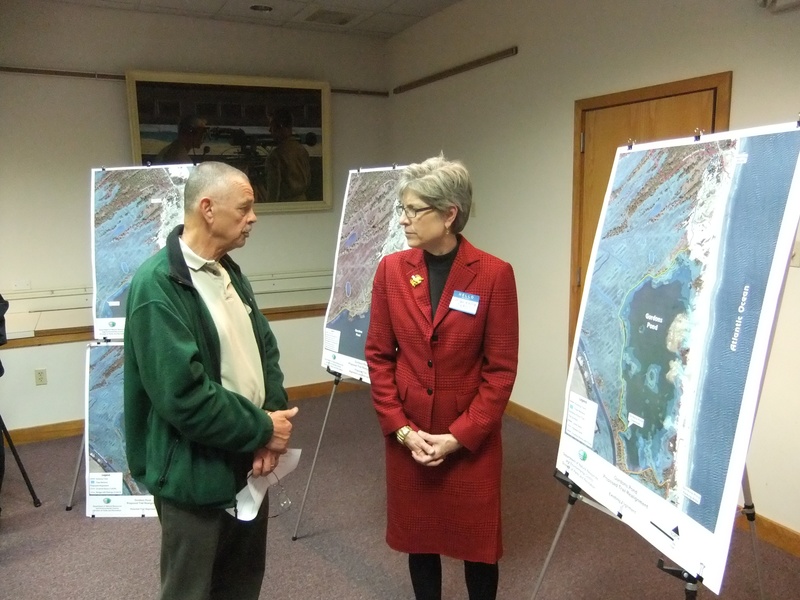Public examines Gordons Pond Trail plans
More than 45 people took an up-close look at detailed plans for a proposed pathway and improved trail linking Gordons Pond and Herring Point in Cape Henlopen State Park.
The Gordons Pond Trail project is a key project in Gov. Jack Markell’s First State Trails and Pathways Plan. When completed, the trail will complete a 15.5-mile loop through Lewes and Rehoboth Beach that includes the Junction and Breakwater Trail in the western section of the park.
The forum, hosted by Department of Natural Resources and Environmental Control and Division of Parks & Recreation, took place Dec. 15 at the Lewes Public Library.
Visitors now have use an 8-foot-wide, .7-mile, crushed stone trail ending at an observation platform overlooking Gordons Pond, and a 1.1-mile undeveloped trail to Herring Point. By improving the 1.1-mile segment, officials hope to protect rare plant and animal species as well as archaeological sites from wayward hikers and bikers who wander onto sensitive areas as they try to use the primitive and mostly unmarked trail.
“We’re pretty confident that what we’ve come up with will have the least impact on the marsh, habitat, piping plover and dunes,” said Lee Ann Walling, DNREC chief of planning. Walling said the original plan called for the trail to cut through marshland.
“We had some negative reaction to that and looked for alternatives,” she said.
A team of DNREC experts chose the trail’s pathway after several field trips and extensive data review. The trail also avoids areas where the dune is likely to shift or move, which could require excessive trail maintenance.
Boardwalk is missing link in trail system
Matt Chesser, Division of Parks & Recreation environmental program administrator, said the Gordons Pond project is another link in a series of connections for existing and proposed trails.
“This trail will greatly improve the nonvehicular connection between Rehoboth and Lewes. There are also great opportunities for education along the trail, including vistas for interpretation and bird watching,” Chesser said.
Mark Chura, Delaware Greenways executive director, said the organization has been a strong advocate of connecting Gordons Pond Trail, Junction and Breakwater Trail and the proposed Georgetown-Lewes Rail-and-Trail.
“When all the pieces are put together, this will be a regionally and nationally significant trail system and an incredible recreational asset for the area,” Chura said.
Rehoboth Beach resident Lowell Markey said the proposed trail effectively addresses all environmental concerns.
“My feeling as a park user is that a lot of people are wandering through this area now. The trail as proposed, with boardwalk and railing through very sensitive areas, might actually reduce the impact of trail use,” said Markey, who regularly walks and bikes the trail.
“I think this is the best trail location I’ve seen. It’ll fit everybody’s needs and take care of the environment,” said Dennis Davison of Rehoboth Beach.
“I think it’s a great idea. I’m very eager to see this project come to its realization. This will give us an opportunity to appreciate more of the nature around Lewes,” said Lewes resident Sabatino Maglione. Maglione and Davison said they enjoy bicycling on the trail.
An opposing viewpoint
One man at the forum, Mike Tyler, said he’s opposed to the state’s plan and distressed about it. Tyler, a Lewes resident and community activist, said late 1990s studies concluded the Gordons Pond area is so environmentally sensitive that a developed trail could ruin its wildlife, plants and landscape.
Tyler said as it is, the section of trail proposed for improvements is not heavily used.
“Why do we need to meddle on every inch of wilderness land? This is one of the most pristine, untouched beach areas we have,” he said.
Tyler questioned why state officials who support the plan want to entice Rehoboth Beach visitors to use Gordons Pond Trail as a transit route to the state park.
“What good is that? It’s not going to get them anywhere but into the state park,” he said. Tyler said the park already experiences several days every season when the number of visitors exceed its carrying capacity.
“What they’re trying to do is encourage more people to come into the park, and to spend $2.1 million on a trail to do it? It just doesn’t make sense,” he said.
Public comment sought
Walling said after receiving public comments about the plan, design and engineering could start and be completed over winter, and construction could begin next fall. She said the project would cost about $2 million.
To submit comments, go to www.destateparks.com/GordonsPond. Public comment will be accepted through Saturday, Dec. 31.
Gordons Pond Trail would cross a sensitive area
A proposed 2,000-foot boardwalk that would span the environmentally sensitive area is the critical component of the proposed Gordons Pond Trail.
David Bartoo, a Delaware Division of Parks trail planner, said the boardwalk has not yet been designed.
“Essentially, we could have a wood superstructure and a host of different decking materials,” Bartoo said.
He said a decking product called ThruFlow, a lattice-like material, would allow light to penetrate to the ground beneath the boardwalk and is being considered. “It would be a huge benefit to plants trying to grow underneath the structure,” Bartoo said.
To minimize soil disturbance during construction, anchors supporting the bridge would be screwed into the ground, he said.
Bartoo said the U.S. Army Corps of Engineers classifies screw anchors a ‘no-disturbance’ method for building support structures in environmentally sensitive areas.
He said designers and engineers have also discussed using top-down construction methods. “That means we would build a section of the boardwalk, move equipment onto that section, and then build the next section. Essentially, we don’t step foot onto the marsh or sensitive areas,” Bartoo said.
He said the boardwalk would be accessible for people with disabilities. Each end of the trail would follow the existing route and be covered in crushed stone.




















































